Tuesday, March 16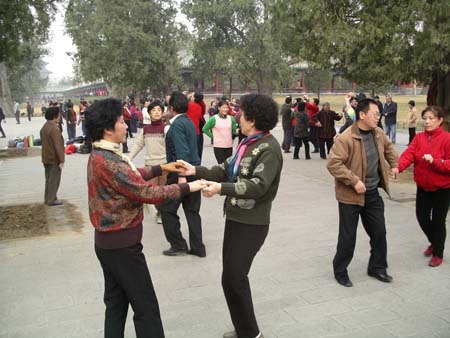
Paula and Steve: We always enjoy our first day in any
new city, particularly when it's also our first day in a new country. We generally
ask our guide to help us combine the major sights with some time spent simply
observing the local culture. For China we know that this will be harder -
we have been told by many people who have traveled here that it's simply more
difficult to get under the surface and that the guides are generally much
more geared toward sta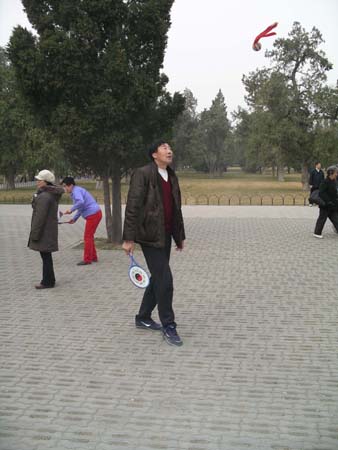 ying
on the standard track. That's why we were pleasantly surprised when Shu changed
things around so that we could be at the Temple of Heaven in the morning,
when scores of Chinese show up to partake in a variety of outdoor recreational
activities. Sounded great to us!
ying
on the standard track. That's why we were pleasantly surprised when Shu changed
things around so that we could be at the Temple of Heaven in the morning,
when scores of Chinese show up to partake in a variety of outdoor recreational
activities. Sounded great to us!
Shu had mentioned ballroom dancing as the main interest of the people who
we would see. 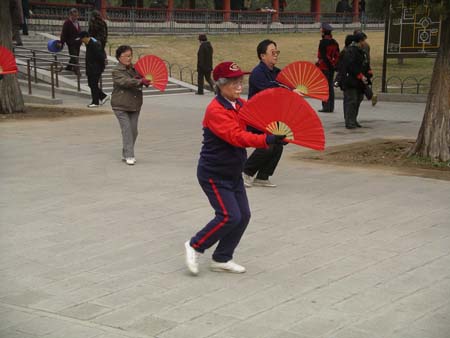 We
had no idea of the wonderful combination of activities that would be here!
This was the Tai Chi and Asian love of exercise that we saw in Hanoi, but
on a much larger scale. The entire area surrounding the Temple of Heaven was
filled with men and women (mostly older) involved in all types of activities,
many which we had never seen before.
We
had no idea of the wonderful combination of activities that would be here!
This was the Tai Chi and Asian love of exercise that we saw in Hanoi, but
on a much larger scale. The entire area surrounding the Temple of Heaven was
filled with men and women (mostly older) involved in all types of activities,
many which we had never seen before.
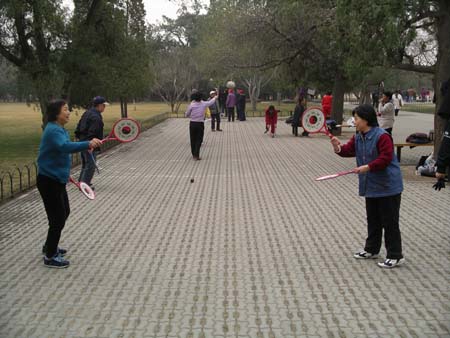 In
addition to standard Tai Chi, we were treated to unusual variations that were
just wonderful to watch. First, we saw "Tai Chi Fan" done with red
fans that were repeatedly opened and snapped shut, with feet stamped in unison
as the fans were closed. "Tai Chi Sword" was being done by people
with long swords in each hand, all swung in exaggerated and coordinated
In
addition to standard Tai Chi, we were treated to unusual variations that were
just wonderful to watch. First, we saw "Tai Chi Fan" done with red
fans that were repeatedly opened and snapped shut, with feet stamped in unison
as the fans were closed. "Tai Chi Sword" was being done by people
with long swords in each hand, all swung in exaggerated and coordinated 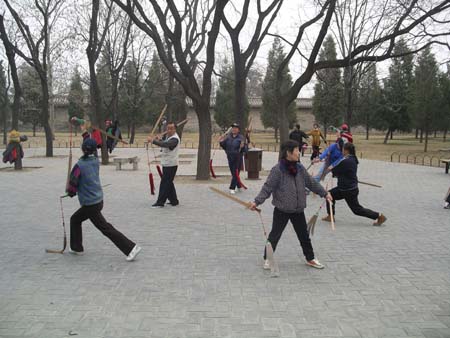 movements.
"Tai Chi Ball" was fun to watch, performed in pairs and incorporating
balls which are caught on paddles and then tossed back. The catch/toss is
performed in a single sweeping motion, and some people got very fancy with
a variety of behind-the-back, under-the-leg and spinning moves.
movements.
"Tai Chi Ball" was fun to watch, performed in pairs and incorporating
balls which are caught on paddles and then tossed back. The catch/toss is
performed in a single sweeping motion, and some people got very fancy with
a variety of behind-the-back, under-the-leg and spinning moves.
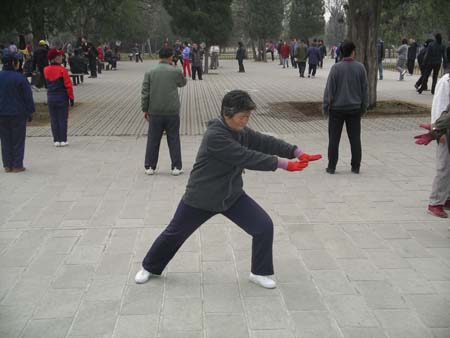 But
this wasn't nearly the end of the things we would see here. Ballroom dancing
is obviously a major interest, and we saw large groups of people, often led
by an instructor, performing a variety of dances to music blared from small
CD players. There is also a type of line dancing that people do - Shu calls
it "senior disco." The people doing the dancing obviously take it
very seriously,
But
this wasn't nearly the end of the things we would see here. Ballroom dancing
is obviously a major interest, and we saw large groups of people, often led
by an instructor, performing a variety of dances to music blared from small
CD players. There is also a type of line dancing that people do - Shu calls
it "senior disco." The people doing the dancing obviously take it
very seriously,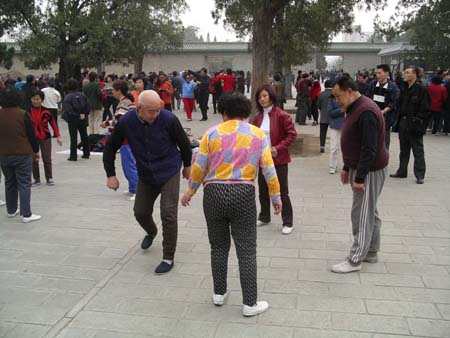 and it was really fun to watch.
and it was really fun to watch.
Next we saw several other types of exercise being done by coordinated groups
of older men and women. There was one with scarves waved to the beat of music,
and another that involved repetitive hitting motions all over ones body. Shu
said this was actually a form of "massage." There were 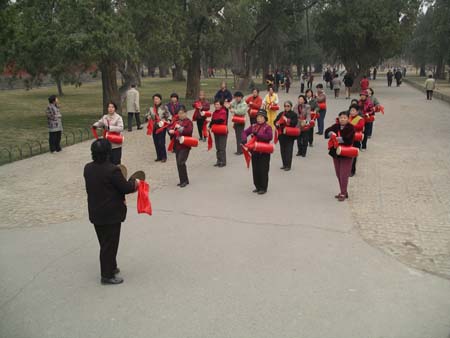 groups
playing jianzi which involves keeping a small feathered object off the ground
by passing it with your foot to other players (we've seen young "hackeysack"
players before, but never 60+ men and women playing a game like this!).
groups
playing jianzi which involves keeping a small feathered object off the ground
by passing it with your foot to other players (we've seen young "hackeysack"
players before, but never 60+ men and women playing a game like this!).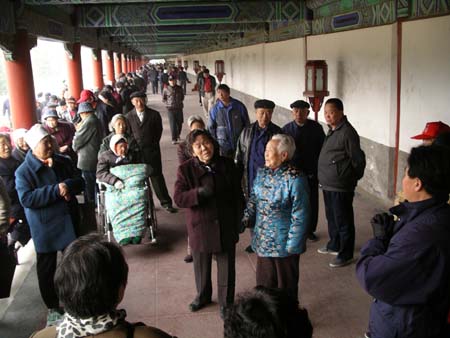
In addition to physical exercise, games are also a major draw here. We watched
as many small groups of people played cards, usually with crowds gathered
around (they even bring the little sponges used to wet fingers, so that the
cards are easier to handle). We watched as older ladies sang traditional songs,
and soloists performed Chinese opera while accompanied by rwhos (stringed
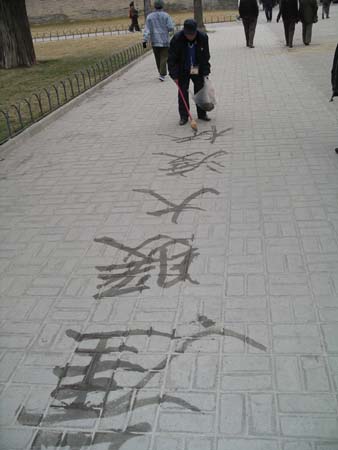 instrument).
There was even a large women's drum corp practicing. Poetry was being written
in the park by a gentleman holding a very large writing brush. He dipped it
in water and wrote the complex Chinese characters right on the sidewalks -
it was fascinating. Still other people played "Chinese Chess" (a
variety of standard chess) and
instrument).
There was even a large women's drum corp practicing. Poetry was being written
in the park by a gentleman holding a very large writing brush. He dipped it
in water and wrote the complex Chinese characters right on the sidewalks -
it was fascinating. Still other people played "Chinese Chess" (a
variety of standard chess) and 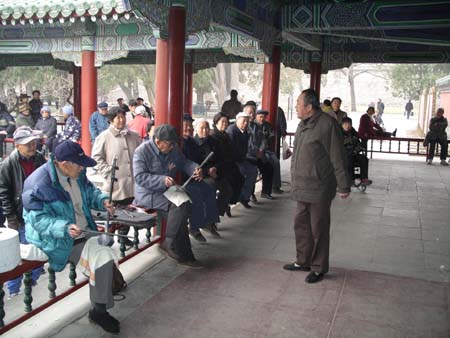 dominoes.
dominoes.
Shu told us that about 3,000 senior citizens gather in this park every single day (even in the winter) and that they look after each other. When someone misses a day, he is checked up on. We are sure this must be the largest "open air senior center" in the world. What a wonderful model!
As we left the park, we thought we were dreaming when we heard "Jingle Bells" being played on one of the traditional instruments. In fact, Shu told us that many Chinese are intrigued by Christmas and enjoy the music and even decorate with Christmas lights and Santa in December.
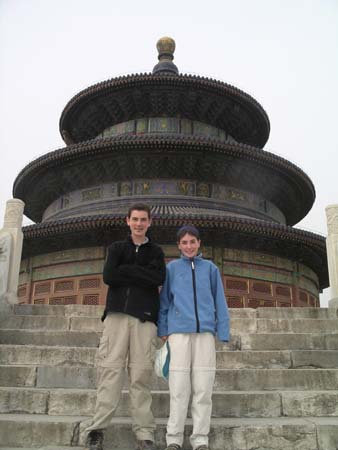 Finally,
after a long stay watching people in the park, we went inside the wall that
houses the Temple of Heaven. This temple was used by the Chinese Imperial
Family twice a year for worship during the period of 1420-1911. It's a beautiful
structure, and we enjoyed wandering around the grounds and learning about
how it was used.
Finally,
after a long stay watching people in the park, we went inside the wall that
houses the Temple of Heaven. This temple was used by the Chinese Imperial
Family twice a year for worship during the period of 1420-1911. It's a beautiful
structure, and we enjoyed wandering around the grounds and learning about
how it was used.
As we left the Temple of Heaven, we had our first conversation with Shu about
life here in China. He spoke first of the economic reforms of the 1980's that
slowly allowed 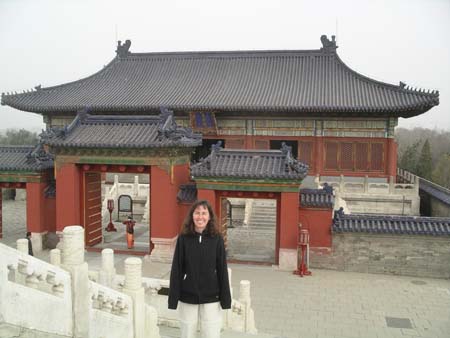 China
to open to the world. This became more pronounced in the 1990's. He told us
that although the government still controls the media and doesn't allow some
channels like CNN or HBO, they have allowed access to CNN on the internet
since 1995. Shu said about 30% of the people in Beijing own personal computers.
Satellite dishes, like we have seen in some of the villages in Southeast Asia,
are not permitted - fines are assessed to those who try. There are several
newspapers in China as well now, although they continue to be published by
the government. Foreign newspapers are found only in the hotels. However,
Shu believes that the majority of well-educated Chinese have full access and
knowledge of world events. Of course, they are not permitted to use this information
to challenge the government in any way.
China
to open to the world. This became more pronounced in the 1990's. He told us
that although the government still controls the media and doesn't allow some
channels like CNN or HBO, they have allowed access to CNN on the internet
since 1995. Shu said about 30% of the people in Beijing own personal computers.
Satellite dishes, like we have seen in some of the villages in Southeast Asia,
are not permitted - fines are assessed to those who try. There are several
newspapers in China as well now, although they continue to be published by
the government. Foreign newspapers are found only in the hotels. However,
Shu believes that the majority of well-educated Chinese have full access and
knowledge of world events. Of course, they are not permitted to use this information
to challenge the government in any way.
Our next stop was the U.S. Embassy. We had run out of pages in David's and Katie's passports and were relieved to learn that the embassy here could add more while we waited. The security around the embassy was incredible (no pictures allowed here), and this actually turned into a very interesting experience. We could not get the van anywhere close to the U.S. Embassy - everything within a 3-4 block area of the building is entirely shut down. Soldiers with machine guns and bullet-proof vests patrol the streets. As we walked through a carefully placed maze of steel fences, our passports were checked a total of 6 times - five by Chinese soldiers and the sixth time by a U.S. marine who also cross-checked our pictures with our drivers licenses. On one occasion we were asked to remove our glasses so that our faces could be viewed more closely. Wow!
Once we made it inside, we had our necessary pages added within 15 minutes
and we were on our way. We were amazed with the number of other American citizens
who were at the Citizen's Service Desk doing the exact same thing. The whole
process was quick and painless, and it was kind of novel for us to be on U.S.
"soil" in the middle of China, even if only for a very short period
of time.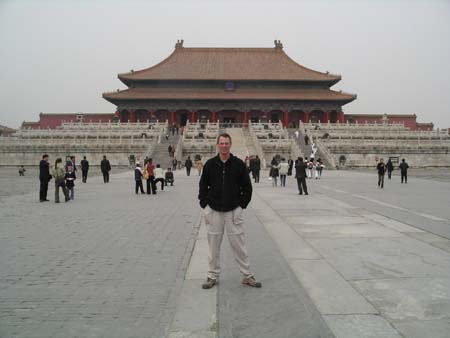
Next it was off to the Forbidden City. This is a 250-area that was originally
surrounded by a wall that common citizens were not allowed to enter - hence
its name. The area inside the wall is composed of a garden, a residential
area and government offices for the imperial family and government that were
used for over 500 years from 1406-1911. Twenty-four emperors lived in the
Forbidden City before China became a republic. The city had 9,990 rooms and
we were able to observe the 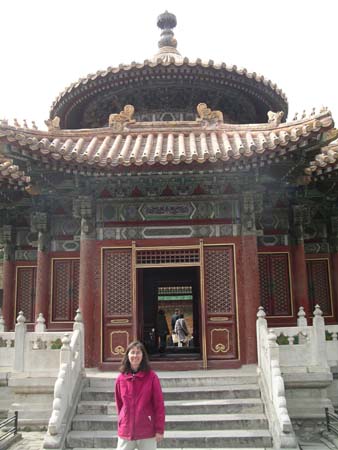 emperors'
garden, dressing room, banquet hall and reception buildings as well as the
large outdoor squares. The most interesting room was the emperor's bedroom,
where he would nightly host one of his 3,000 concubines that lived inside
- tough life!
emperors'
garden, dressing room, banquet hall and reception buildings as well as the
large outdoor squares. The most interesting room was the emperor's bedroom,
where he would nightly host one of his 3,000 concubines that lived inside
- tough life!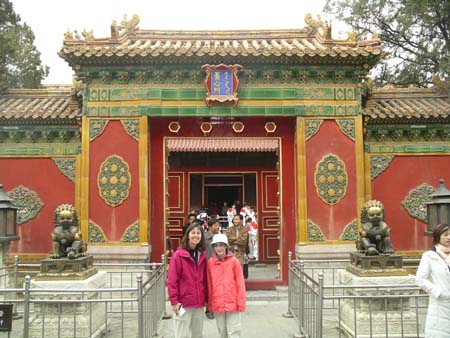
There was a large group of Chinese middle school students visiting at the time and Shu explained to us the importance of education in Chinese society. Students study extremely hard for 12 years in order to prepare for the university entrance exams. Only about 25% of students will have an opportunity to attend the university because there are simply not enough schools of higher education here.
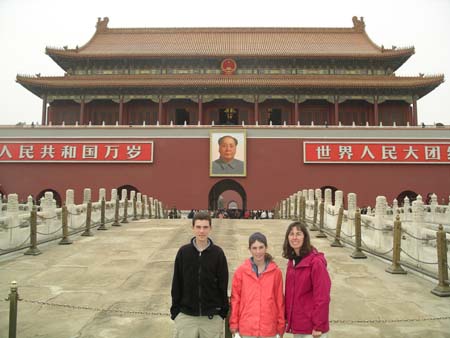
As we left The Forbidden City, we looked back at the Tiananmen Gate to see
the large and famous portrait of Mao Zedong, and just across the boulevard
we got our first glimpse enormous Tiananmen Square. This is the largest public
square in the world and also famous because of the student protests and military
force that was used in 1989. The portrait of Mao is where the students constructed
their "Goddess of Democracy" statue preceding the violence that
happened here. The boulevard that we crossed to enter the square is the place
where the famous encounter between the student and the armored tank occurred
(standing here today, it actually wasn't too hard to imagine…). The square
itself is flanked on three sides by the People's Congress, the National Museum
and Chairman Mao's Mausoleum. In the center of the square is a memorial for
victims of the civil war called The People's Heros Monument. Shu was reluctant
to talk about the events of 1989 while we were in the square but we hope to
discuss this with him more tomorrow.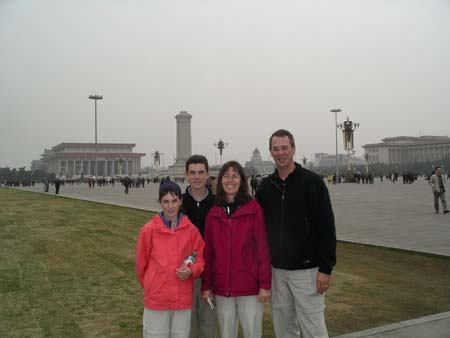
His reluctance was understandable given the presence of soldiers. We have
seen more soldiers here than any of the places we have visited so far. They
have been in all parts of Beijing and their presence was particularly evident
in the Forbbidden City and Tiananmen Square. In these areas we could actually
see groups of soldiers training and going through drills. Some the soldiers
wore business suits, and Shu explained that these were "plain clothed"
soldiers who patrol without 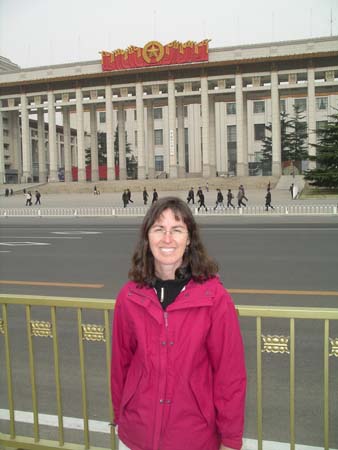 the
public being aware of their presence. Groups of soldiers marched and practiced
their hand-to-hand combat skills right along side Tiananmen Square. This made
for a somewhat ominous atmosphere.
the
public being aware of their presence. Groups of soldiers marched and practiced
their hand-to-hand combat skills right along side Tiananmen Square. This made
for a somewhat ominous atmosphere.
We did speak more with Shu about all the changes that have occurred in China
during the past 25 years. Shu indicated that the Chinese citizens enjoy greater
freedoms than ever before. He remembers the days when people weren't free
to select their own 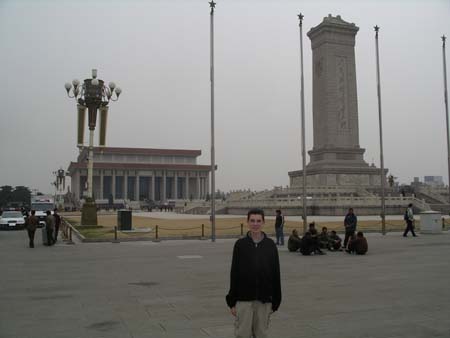 professions
and had no access to the outside world. Some restrictions have only been recently
removed - for example, prior to 1995 the government blocked specific web sites
(e.g. CNN, New York Times). However, some still remain, as evidenced by the
fact that people are not able to watch CNN or any foreign news stations on
television.
professions
and had no access to the outside world. Some restrictions have only been recently
removed - for example, prior to 1995 the government blocked specific web sites
(e.g. CNN, New York Times). However, some still remain, as evidenced by the
fact that people are not able to watch CNN or any foreign news stations on
television.
Shu spoke about the family planning law, which strictly enforces a 1-baby-per-family
regulation. The fines for violating this rule are stiff - Shu estimates that
it's $5,000 for a Beijing family. Women who 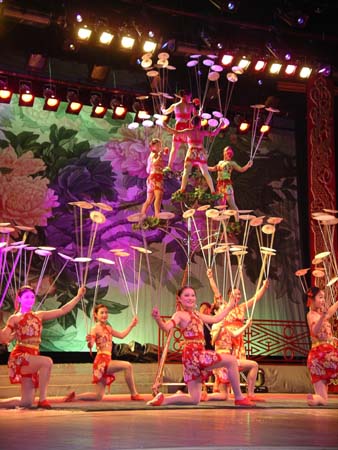 get
pregnant and already have a child are expected to get abortions. In Shu's
opinion, the government had no choice - this was the only thing that could
be done to control China's rapidly growing population.
get
pregnant and already have a child are expected to get abortions. In Shu's
opinion, the government had no choice - this was the only thing that could
be done to control China's rapidly growing population.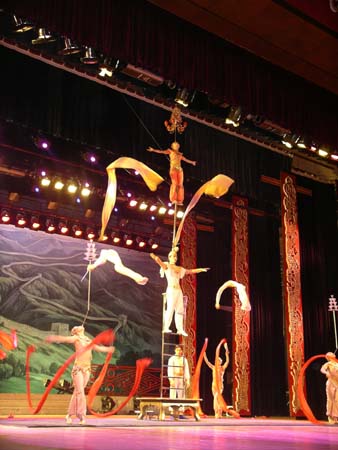
This evening we attended a marvelous performance of Chinese acrobats. We enjoyed a wide variety of stunts performed by contortionists, tumblers and other performers. Beijing is famous for its acrobats, so this was a real treat.
We had a difficult time today adjusting to the cool weather. By late afternoon, it felt like the temperature was in the high 40's, with a brisk wind. For the first time in a while, we were cold! Coming from the brutal heat and humidity of Cambodia, this has been quite a shock to our systems.
Tomorrow we have a full day planned exploring the Great Wall of China.
